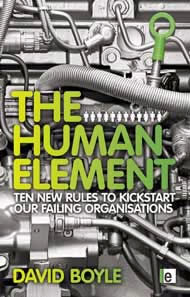David Boyle comes bearing good news: human brilliance may be more widespread than we think. Sadly though, when it comes to the expertise of our workforces, for the past century we’ve grown to view our cup as half empty rather than half full. In an attempt to avoid human error, we’ve obsessively created systems, targets, databases and policies that give off a thick smokescreen of efficiency whilst masking an underlying drought of effectiveness. Boyle argues that the human element may be a source of error in the workplace – but it is also the only source of genuine change required to really kick-start our failing organisations.
I expected this book to be an attack on all multinationals, but in fact it focuses just as much on the few maverick big boys such as Semco and W.L. Gore that have ditched the constraints of hierarchy and scientific management pioneered by Henry Ford and Frederick Winslow Taylor. Instead these firms are following the people principle and giving responsibility back to staff.
Now I understand why the workers in my high-street shoe repair and key cutting shop, Timpsons, always seem so bright and cheerful. When the rebellious chairman, John Timpson, organised the buyout of his family firm (in 1983), he decided to gamble his business by investing some trust in store managers, treating them as an asset. By burning all the rule books and recruiting on the basis of their personality – rather than whether or not they could mend shoes or cut keys – he created a model of upside-down management where the individual managers of each store are even allowed to decide how much to charge their customers. This has proved so successful and profitable that since then the business has grown from 200 to nearly 700 stores around the UK.
Early on the author provides us with an historical reminder that ignoring the human element will end in catastrophe. Understanding that excessive administration and bureaucracy contributed to the fall of the Roman Empire should serve as a warning to modern-day governments who “have their sweaty fingers gripping desperately to the throats of their most distant employee”.
Two stories of former commanders of the British Mediterranean Fleet offer a lesson in leadership for chief executives. First, the highly successful Nelson, who instead of fostering a slavish obedience to detail encouraged an enthusiastic commitment to the fleet’s objective – allowing staff to break with conventional thinking and use their intuition instead. Once at sea the captains were largely at their own command without the risk of micromanagement from the admiralty. In contrast, Nelsons’s successor Admiral Sir George Tryon took a different tack, with a religious monitoring of crew and a dictatorial control that resulted in the loss of 350 sailors’ lives.
Boyle’s sharp and witty writing style reveals the absurdity of our modern living, with numerous examples from the public sector of when the erosion of reciprocal human relationships has led to massive wastage and suffering. I felt angry reading about the many multi-billion-pound government software projects that fail to do the job they were designed for and end up being scrapped. The benefits claimants who are kept on hold for so long at call centres that their pay-as-you-go bills rack up £35 charges. The A&E nurses who know that patients need them urgently but who instead of being able to get on with the job of nursing have to go through 20 pages of questions for each one. The author suggests that, rather than tightening up systems even further and automating even more public services, real effectiveness can only happen when people are given whole jobs to do and then the freedom to innovate.
The ten rules for kick-starting our failing organisations described in this book could be boiled down to a one-page crib sheet and stuck on every manager’s office door – but it’s the padding-out via repeated case studies that acts like a kind of mantra for a healthier way of working. Boyle calls for a return to common sense with a Gandhian appreciation of people’s value and a Small is Beautiful application of management and teamwork. He admits it may be more expensive initially but it will, he promises, cost much, much less in the long run, because it really works.
I’m not entirely sure how senior policymakers will put this book into practice – maybe just by making less policy and allowing more space for common sense to flourish. However, what I can say for certain is that it has influenced the way I’ve worked recently – reminding me not to put targets and budgets before people.








